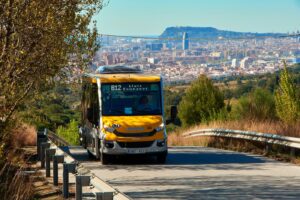CAPACITATS TECNOLÒGIQUES
La UPC desenvolupa les següents capacitats tecnològiques en l'Internet of Things:
CONNECTIVITAT I DATA SCIENCE
- Intel·ligència artificial
- Vehicles autònoms
- Robots col·laboratius
- Aparells mèdics
- Biosensors
- Blockchain
- Ciberseguretat
- Big data analytics
- Data science
- Wireless sensor networks
SECTORS D'APLICACIÓ
L'expertesa de la UPC abasta solucions d’aplicació transversal en diferents sectors, com ara:
AUTOMATITZACIÓ
- Automatització industrial
- Computer visions for quality control
- Fabricació additiva
- Logística
- Comunicació industrial
MOBILITAT
- Rutes Dinàmiques
- Transport Públic
- Nous conceptes de mobilitat
- Simulació de tràfic
SALUT
- Digital health
- Biomecànica
- Atenció al pacient
- Diagnòstic remot
- Tecnologies per l'esport
- Assistència a persones
SMART FARMING
- Sensors de l'agricultura
- Automatització d'efecte hivernacle
- Gestió de cultius
- Seguiment i cura dels animals
URBANISME I ARQUITECTURA
- Smart building i Smart office
- Space occupancy and utilization
- Smart materials
ENERGIA
- Gestió d'energia
- Emmagatzematge d'energia
- Smart Grids
- Modelació i simulació
PROJECTES RELACIONATS
- The Barcelona Innovative Transportation (BIT), the Research Center in Automotive and Advanced Mobility (CER-AMA) and The Future Mobility Research Hub (CARNET) research groups from the Universitat Politècnica de Catalunya - BarcelonaTech (UPC) are participating in the E-MED project, which aims to optimise energy and resource efficiency in public transport systems by addressing energy price fluctuations through smart and participatory solutions across the Mediterranean region.
- A team led by the Electronic and Biomedical Instrumentation (IEB) research group at the Universitat Politècnica de Catalunya - BarcelonaTech (UPC) is developing an electronic chip that enables more objective detection of potential infractions in race walking, which are currently judged solely by visual observation. The technology, already tested in official competitions, provides accurate, objective, and fair data on race walkers’ loss of ground contact.
- The digitalisation of human senses has advanced significantly in areas such as vision, hearing and touch. However, smell and taste continue to present a technological challenge, as their analysis relies on the identification of volatile or dissolved chemical compounds. While there are various sensors on the market capable of detecting specific gases and substances, they often lack the versatility required for comprehensive recognition of complex odours, showing limitations in adapting to different combinations of compounds.
- The Center for Technological Innovation in Static Converters and Drives (CITCEA) at the Universitat Politècnica de Catalunya – BarcelonaTech (UPC) has designed a smart wireless application developed to optimize the electricity consumption of high-power devices.




